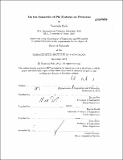| dc.contributor.advisor | Danny Fox, Martin Hackl and Irene Heim. | en_US |
| dc.contributor.author | Sudo, Yasutada, Ph. D. Massachusetts Institute of Technology | en_US |
| dc.contributor.other | Massachusetts Institute of Technology. Dept. of Linguistics and Philosophy. | en_US |
| dc.date.accessioned | 2013-03-13T15:49:08Z | |
| dc.date.available | 2013-03-13T15:49:08Z | |
| dc.date.copyright | 2012 | en_US |
| dc.date.issued | 2012 | en_US |
| dc.identifier.uri | http://hdl.handle.net/1721.1/77805 | |
| dc.description | Thesis (Ph. D.)--Massachusetts Institute of Technology, Dept. of Linguistics and Philosophy, 2012. | en_US |
| dc.description | Cataloged from PDF version of thesis. | en_US |
| dc.description | Includes bibliographical references (p. 246-260). | en_US |
| dc.description.abstract | This thesis investigates three topics relating to the semantics of phi features on pronouns. Part I focuses on gender features on pronouns. Following previous studies (Cooper 1983, Heim & Kratzer 1998), I claim that they are presupposition triggers. Based on this assumption, I show that predicates containing bound gendered pronouns have an assertive meaning that does not entail the gender presupposition, and further point out that such predicates pose a serious challenge for existing theories of presupposition projection, especially with respect to quantified sentences. A conclusion drawn from this discussion is that the presupposition needs to be dissociated from the assertive meaning, as in Karttunen & Peters's (1979) two dimensional theory. However, such a theory is known to run into the so-called binding problem in quantified sentences. I propose a solution to the binding problem using the mechanism of cross-sentential anaphora, and show that the resulting theory nicely accounts for the projection properties of various quantificational determiners. Part II discusses the interpretation of person and number features on bound pronouns. It is known that some occurrences of phi features on bound pronoun behave as if they are semantically inert (Heim 2008b, Jacobson to appear, Kratzer 1998a, 2009, Partee 1989). One popular account of this phenomenon, the minimal pronoun account, claims that such phi features are purely morphological, and postulates a PF operation that transmits phi features of a binder onto each pronoun that it binds (Heim 2008b, Kratzer 1998a, 2009). I put forward an alternative account that dispenses with the PF operation, and instead puts most of the burden on syntax, by encoding more information in the indices than standardly assumed. As a result, all occurrences of phi features are semantically relevant. I offer both empirical and conceptual arguments for the proposed account over the minimal pronoun account. Part III deals with the phenomenon of indexical shifting where person features are systematically affected (Anand 2006, Anand & Nevins 2004, Schlenker 1999, 2003b). I discuss novel data from Uyghur and Japanese as well as data drawn from previous studies, particularly focusing on the universals and variation within and across languages. | en_US |
| dc.description.statementofresponsibility | by Yasutada Sudo. | en_US |
| dc.format.extent | 260 p. | en_US |
| dc.language.iso | eng | en_US |
| dc.publisher | Massachusetts Institute of Technology | en_US |
| dc.rights | M.I.T. theses are protected by
copyright. They may be viewed from this source for any purpose, but
reproduction or distribution in any format is prohibited without written
permission. See provided URL for inquiries about permission. | en_US |
| dc.rights.uri | http://dspace.mit.edu/handle/1721.1/7582 | en_US |
| dc.subject | Linguistics and Philosophy. | en_US |
| dc.title | On the semantics of phi features on pronouns | en_US |
| dc.type | Thesis | en_US |
| dc.description.degree | Ph.D. | en_US |
| dc.contributor.department | Massachusetts Institute of Technology. Department of Linguistics and Philosophy | |
| dc.identifier.oclc | 828407318 | en_US |
